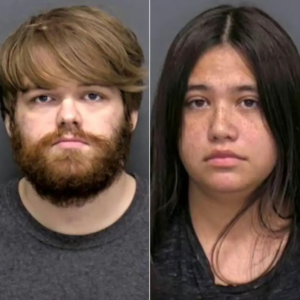The Tragic Story of Little Zaelynn: A Life Lost in a 109-Degree Closet
In one of the most heartbreaking and disturbing cases to emerge in recent memory, the story of 4-year-old Zaelynn unfolds like a nightmare no child should ever endure. The young girl from Galveston, Texas, died after being left in a sweltering closet that reached temperatures of 109 degrees—by the very people who were supposed to protect her: her parents.
According to police reports, Zaelynn was found unresponsive in a small closet on March 25, 2024, in her family’s home. She was later pronounced dead at a local hospital. The temperature inside the closet at the time of her rescue was estimated to be at least 109°F, with no ventilation and little light. The humidity in the space, combined with the extreme heat, created a deadly environment—akin to being locked in an oven.
Her parents, 24-year-old Breanna McGee and 25-year-old Elijah Thomas, were arrested and charged with capital murder and child endangerment. Authorities allege the couple routinely used the closet as a form of punishment, locking Zaelynn inside for hours at a time without food, water, or access to a restroom. Investigators described the conditions as “inhumane,” noting that the closet had a strong stench of urine and feces and was cluttered with trash and clothing that restricted airflow.
Court documents paint a chilling picture of prolonged abuse. Neighbors said they rarely saw Zaelynn outside and were unaware that a child even lived in the home. One neighbor admitted to hearing “occasional crying,” but said it never occurred to them that something so horrific was happening behind closed doors.
Perhaps even more disturbing is that there were signs. Child Protective Services had reportedly visited the home in the past, although details on any prior investigations remain limited due to privacy laws. There’s growing public outcry questioning how the system failed to protect Zaelynn before it was too late.
An autopsy confirmed that Zaelynn died of hyperthermia—her body simply overheated in the suffocating conditions of the closet. Her core temperature at the time of death was well above survivable levels. She also showed signs of malnutrition and previous injuries, suggesting long-term abuse.
“This was not a momentary lapse in judgment,” said Galveston County District Attorney Jack Templeton in a press conference. “This was a pattern of cruelty, of neglect, and ultimately, of murder.”
The tragedy has left the community reeling, with many gathering at a makeshift memorial outside the home where stuffed animals, flowers, and candles now sit beneath a sign reading: Justice for Zaelynn.
While her short life ended in horror, Zaelynn’s story has reignited conversations about the cracks in the child welfare system, parental accountability, and the responsibility of communities to look out for the most vulnerable among us.
Zaelynn should have been preparing for kindergarten. She should have had birthday parties, bedtime stories, and a future full of promise. Instead, her name will now be remembered as a symbol of heartbreaking failure—and a call to do better.
